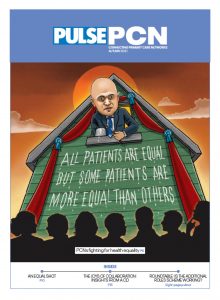
Think post-pandemic future and you think reduced treatment backlog and healthier communities but delivering on those long-term aims presents a challenge every bit as demanding as the defeat of the pandemic itself. Professionals from every corner of the health and care system will have a vital part to play, and, in the new, much-vaunted world of place-focused integrated care delivery, Primary Care Networks will want to ensure they are ready to play a leading role. One other thing that is certain is that data will be at the centre of everything.
From prevalence mapping to continuity of care; budgetary prioritisation to targeted treatment intervention: the sharing of high quality clinical data will be mission-critical for Integrated Care Systems tasked with helping to transform the health and care landscape. Collecting, standardising and interpreting that data will be as important as it gets, and that means PCNs must have the right skills and tools to deliver.
“Access to timely and accurate data is essential in determining community-based health and care strategies,” says Andrew Frangleton, Managing Director of Clinical Architecture – a UK-based data analytics provider. “Post-pandemic, GPs are under huge day-to-day time pressure, but PCNs will also be under pressure to produce and share high-quality patient data that helps inform their local integrated care strategy. Thankfully, digital tools exist to help manage the process; not by exception but by routine.”
Clinical Architecture’s innovative ‘Clinical Data Intelligence’ (CDI) solution sits alongside a GP clinical system, routinely analysing data and identifying actionable information capable of making a real-world difference to patient outcomes. “It’s about ensuring that high quality data is available to provide the strong foundation necessary to support good decision making and allowing the right strategic focuses to be applied,” says Frangleton. “It’s also about identifying risk, maximising the appropriateness of care and proactively optimising healthcare processes.” This ask of PCNs will be the new normal going forward, so it’s vital they have the right tools to make efficient and effective use of resources.
The solution is already delivering tangible results.
A PCN in the south of England is being supported by Clinical Architecture to transform the management of its most vulnerable patients and those with chronic conditions. By standardising and analysing the data, CDI ensures the accurate coding of patients likely to be suffering from chronic conditions such as respiratory disease, kidney disease, diabetes, learning disability and osteoporosis; quickly allowing them to be placed on appropriately commissioned clinical pathways. Understanding the clinical data captured during the ‘day to day’ activities of a practice is becoming best practice, but the right tools are necessary to achieve this.
One organisation’s Medical Director describes it as a “win, win for all stakeholders. Everything depended on good quality data and the team at Clinical Architecture ensured that’s what we got,” he says. “We saw dramatic improvements and, once our own teams had gotten to grips with the adoption of the technology, we were able to transform the way we functioned. We continue to benefit from CA’s support and expertise and, as the quality of the practice data continues to improve, so does the quality of the care we deliver.”
As we head down the post-pandemic road, it seems data is set to star. Picking the right partner to act as a guiding hand will ensure the journey is as smooth as possible.

